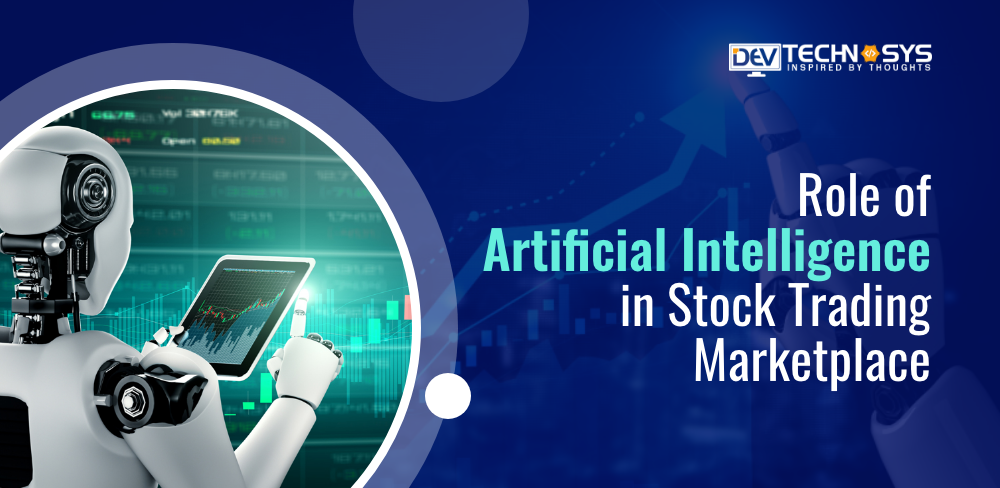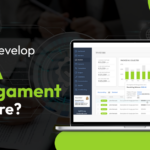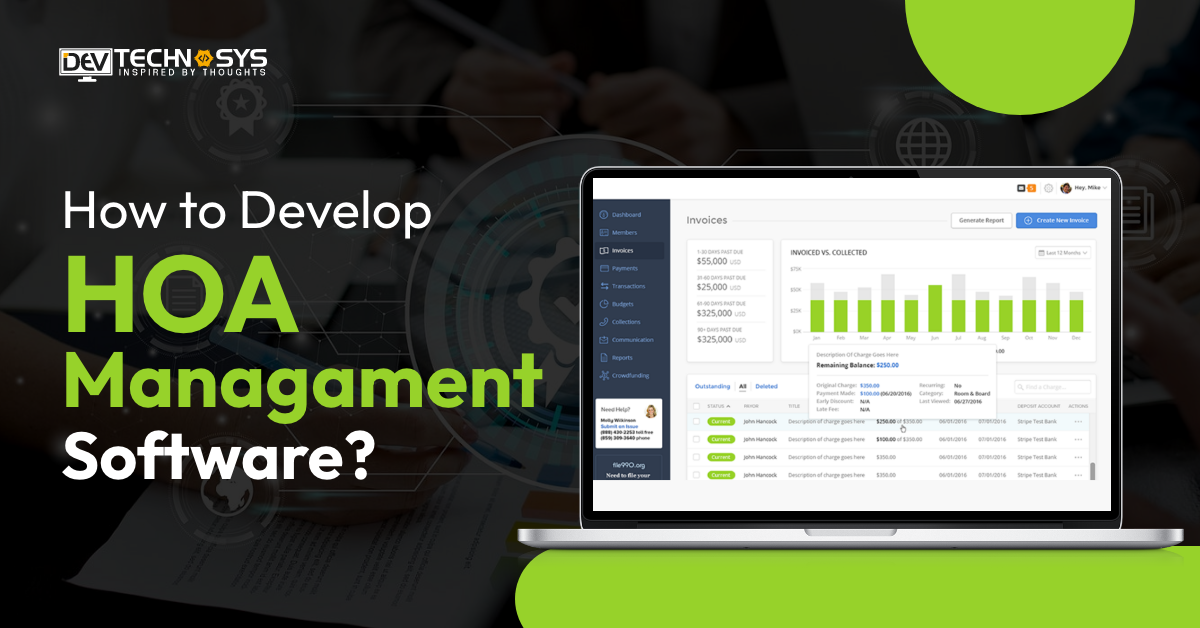In today’s fast-paced financial landscape, the integration of AI in stock trading has emerged as a game-changer, revolutionizing the way market participants make investment decisions and manage their portfolios.
The markets are buzzing with activity 24 hours a day, 7 days a week. Stock trading, which was once solely based on human intuition and expertise, has undergone a dramatic transformation since the introduction of AI technology.
Imagine a world in which complex trading decisions that were once dependent on human judgment are now handled by machines capable of processing vast amounts of data within milliseconds. AI has revolutionized the world of stock trading.
In this blog post, we will explore the fascinating journey of AI integration in the stock trading market.
Table of Contents
What is AI in Stock Trading?
AI in stock trading is the use of artificial intelligent technologies such as machine-learning and data analysis algorithms to make informed decisions when buying, selling and managing financial assets.
AI systems use a vast amount of data from the market, including historical trends, current news and other factors, to identify trading opportunities and manage risk.
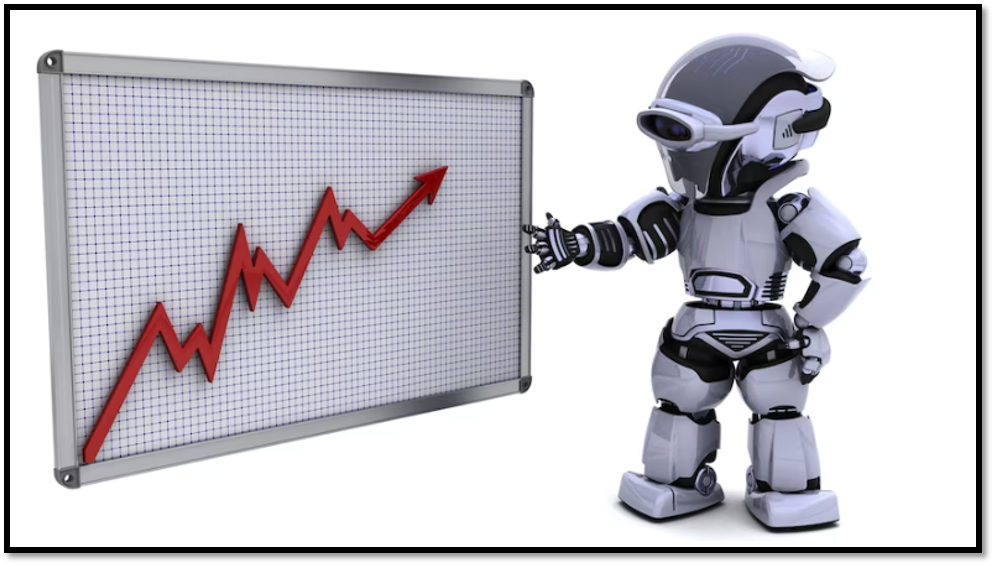
With the rising demand for stock trading app development, various businesses are able to execute trades quickly, adapt to changing conditions in the market, and offer valuable insights to investors and traders.
AI in stock trading is aimed at improving decision-making and automating trading processes. It also optimizes portfolio management.
Stock Trading Current Market Stats
AI’s application in stock market analyses has led to unprecedented advancements in the processing of data and decision making. AI algorithms have the capacity to quickly examine massive volumes of data and offer insightful information that statistical models are unable to.
Financial institutions were quick to adopt this technology and became early adopters in their quest for competitive advantage. The market value of online trading will reach $12 billion in 2028. This increase is predicted to be significantly influenced by AI.
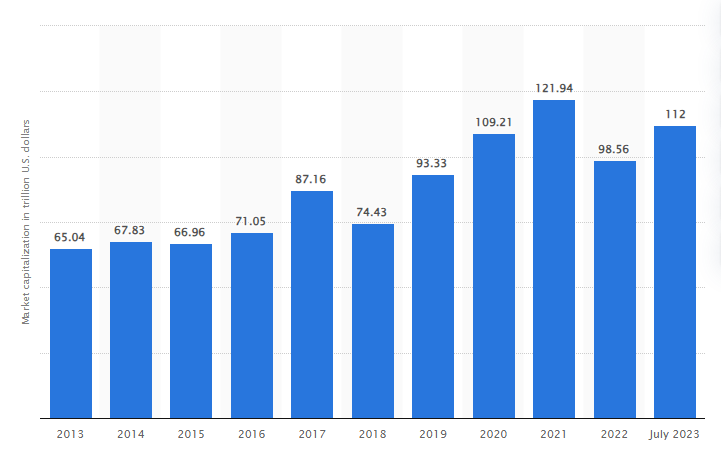
- The global equity market is expected to grow from 65,04 trillion U.S. dollars in 2013 up to 98.5 trillion U.S. dollars in 2022.
- As of July 2023, domestic firms registered on stock exchanges throughout the world have a combined market capitalisation of 112 trillion US dollars.
- In 2020, global equity trading will reach over $32 trillion, up from a little more than $25 trillion, in 2009.
- The U.S. ai stock market NASDAQ and NYSE account for 39%, or more than $31 trillion of the total global market value.
Role of AI in Stock Trading Industry
Artificial Intelligence is a growing and important part of the stock trading market. It has changed the way that financial markets work, allowing traders and investors to make better-informed decisions and execute their trades more efficiently. Here are some of the key aspects given by trading software development company that AI plays in the stock market:
-
Algorithmic Trading
AI-driven algorithms can be used to implement high-frequency or quantitative trading strategies.These algorithms have the capacity to quickly execute transactions, spot patterns in vast volumes of data in real time, and evaluate data in ways that human traders cannot. Additionally, AI in stock market trading systems are able to modify their trading tactics in response to shifting market conditions.
-
Predictive Analytics
AI models such as machine learning or deep learning are used to predict future movements in stock prices. These models use historical data, news sentiments, macroeconomic indicators and other factors to make predictions. Predictive analytics helps traders make informed decisions on when to buy and sell stocks.
-
Risk Management
Traders and portfolio managers may analyze and manage risk with the use of AI. Models for risk prediction can be used to identify market volatility, portfolio exposure, and potential risks. With this knowledge, investors may choose more wisely when it comes to hedging, asset allocation, and other methods.
-
Sentiment Analysis
AI powered sentiment analysis tools scan articles in news, social media and other information sources to gauge public opinion about certain stocks or the entire market. Understanding investor sentiment can help traders predict market movements.
-
Portfolio Optimization
AI can optimize portfolios by taking into account factors such as risk tolerance, return objective, and market conditions. These stock trading AI systems can recommend the best asset allocation and investment strategy to achieve desired results.
-
Market Surveillance
AI may be used by regulators and exchanges to track trade activity for illicit practices like insider trading and market manipulation. AI can detect abnormal trading patterns more effectively than traditional methods.
-
Quantitative Research
AI helps quantitative analysts develop trading strategies through tools that analyze large datasets, test hypotheses, and provide analytical support. Machine learning is able to identify patterns and relationships which may not have been apparent in traditional analysis.
How AI is Used in Stock Trading?
In this section, we will discuss the uses of AI in stock trading marketplaces. So let’s have a look:
1. Advanced Data Analysis
AI algorithms are able to process huge amounts of financial information in real-time, allowing investors to make informed decisions. The enormous amount of data available is sometimes impossible to acquire and comprehend using AI in stock trading stock analysis techniques. This can lead either to missed opportunities or poor judgments.
On the other hand, AI can quickly scan massive databases to spot trends and extract insightful facts that might influence investing strategy. With the use of AI-powered tools, investors can now monitor business performance, analyze risk factors, and predict market AI trends more accurately.
2. Algorithmic Trading
Algorithmic trading, commonly referred to as quantitative trading, has been transformed by AI. Algorithmic Trading relies on mathematical models and predefined rules to execute trades with high speed and frequency.
AI algorithms are able to analyze news sentiments, market data and other factors in order to make split second trading decisions. These algorithms can take advantage of market inefficiencies and short-term price differences, as well as manage risk more efficiently. AI-powered algorithmic trading has become popular among hedge funds and institutional investors.
3. Fraud Detection And Risk Management
AI in stock trading systems are making major strides towards fraud detection and risk management. AI algorithms are able to detect unusual trading patterns, detect possible market manipulations, and recognize fraudulent activity faster than humans.
As per an AI development company, artificial intelligence systems can detect suspicious activity in real-time by monitoring large amounts of data, and using AI for stock trading complex algorithms. This helps market participants and regulators maintain investor confidence and market integrity.
4. Access To Advanced Investment Strategies
You can see a huge impact of AI on the stock market by allowing investors to access advanced investment strategies. Prior to AI, sophisticated strategies and advanced techniques had been primarily available to institutional investors and hedge fund traders.
AI-driven platforms for investment have made advanced strategies accessible to retail investors. Using AI powered stock trading algorithms, these systems build unique investing portfolios for each user depending on their risk tolerance, financial objectives, and market circumstances. AI-powered insights provide a greater range of opportunities to investors.
Top 5 AI Stock Trading Apps
There are multiple online trading platforms like the eToro app, webull etc that are doing well in the market. However, we have listed down the most popular one that you must take into consideration.
Stock Trading Apps |
Available Platforms |
Downloads |
| TrendSpider | Android | iOS | 10K+ |
| Candlestick | Android | iOS | 10K+ |
| Black Box Stocks | Android | iOS | 10K+ |
| Q.ai | Android | iOS | 50K+ |
| OnFinance | Android | 50K+ |
1. TrendSpider
TrendSpider, an AI-based stock trading app, will help you create, test and optimize your own trading algorithm, in addition to automated trading techniques. This application is renowned for its robust algorithm, wide range of features, and customized dashboard. Its technical specifications and strategy will require very little human interaction.
2. Candlestick
Candlestick App is a mobile app designed for traders and stock market enthusiasts. It offers real-time charts that show stock prices in a visually appealing way. This helps users to analyze trends.
Users can choose their own chart timeframes, indicators and make informed trading decisions using historical price patterns. Apps often include features such as technical analysis tools and news feeds.
3. Black Box Stocks
Black Box Stocks is a powerful tool for investors and traders that offers real-time information and insight. The app offers features like live stock market scans, options flow monitoring, and alerts for unusual options activity. Knowing the cost to develop a crypto trading app is vital before starting the development process.
Users can get detailed information about stocks, cryptocurrencies, and options. This helps them make informed decisions. App’s proprietary algorithms analyze market data and offer ai trading signals
4. Q.ai
Q.ai, a financial application designed for investors to provide them with AI-driven insights as well as portfolio management tools. This is the best AI app for stock trading that provides automated trading, individualized financial advice, and real-time market data.
Users may alter their portfolios to suit their unique financial objectives and risk tolerance. The AI investing software uses advanced machine learning techniques to analyze news sentiment and market trends, helping users make informed choices.
5. OnFinance
The “OnFinance app” is a comprehensive tool for managing money. It empowers users to manage their finances effectively. It has features like budget tracking, expense categorization and investment monitoring. The business can integrate features with the help of Investment app development services providers.
With its user-friendly layout, it makes financial planning easier and aids users in achieving their financial objectives. OnFinance provides real-time information on cryptocurrency investments, stock portfolios and financial health.
Benefits of AI in Stock Trading
Now that you are familiar with the examples of AI stock trading apps, we will now check out the benefits of AI in stock trading industry. So let’s have a look:
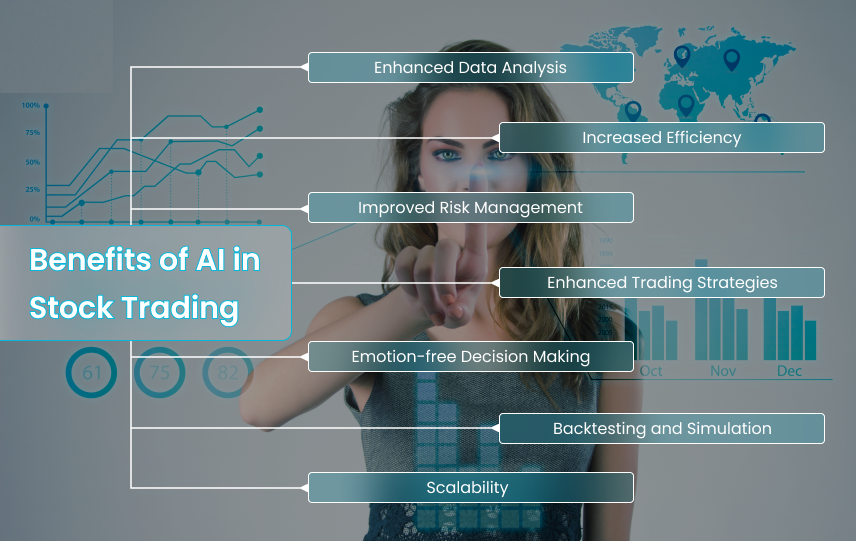
1. Advanced Data Analysis
AI is a powerful tool for stock trading. It can instantly process enormous amounts of data. Traditional traders spent hours manually analyzing charts and financial reports.
They then turned to AI in stock trading algorithms that processed this data much faster, identifying patterns and trends that humans would have missed. This allowed traders to make better decisions using AI to trade stocks accurate and current information.
2. Increased Efficiency
AI-powered trading platforms can perform tasks more efficiently and quickly than humans. AI algorithms can, for example, execute trades within milliseconds, which is a huge advantage in markets that are fast-paced and where split-second decision-making makes a difference.
This is one of the best online trading platforms. AI trading systems automate repetitive tasks, saving traders time that they can use to create and analyze strategies.
3. Improved Risk Management
AI in stock trading carries inherent risks, which must be carefully managed. Artificial Intelligence can help traders identify risks and opportunities by analyzing market trends and historical data. With more accurate risk assessments, traders are able to minimize losses because they take into consideration multiple factors at once.
Real-time market monitoring and trade execution using pre-established risk management procedures are both capabilities of AI algorithms. However, if you want to build a chatbot for your investment business, then you must consult with a chatbot app development services provider.
4. Enhanced Trading Strategies
Artificial intelligence (AI) algorithms can adjust to shifting market conditions and learn from the past to continuously improve trading approaches. AI, through machine learning techniques in the stock market, can identify profitable patterns.
This adaptive nature allows traders to stay ahead of trends and to take advantage of opportunities that would have otherwise been difficult to identify.
5. Emotion-free Decision Making
Trading stocks can be affected by emotions, which can lead to poor judgment and irrational decisions. Fear, greed and other emotions can influence decisions during stock trading sessions, leading to costly mistakes.
AI in stock trading is able to make decisions without emotion and solely on the basis of data and predefined rules – this helps traders stay focused and stick to their strategy even in volatile market conditions.
Future of AI in Stock Trading Industry
AI is set to have a huge impact on the stock market, and it will continue to change how we invest and trade. To understand its potential, here are some key points that showcases the future of AI in stock trading industry:
1. Enhancing Decision Making
Trading and investing will increasingly rely on AI as a tool to help them make better choices. Large datasets, historical trends, and current sentiment in the news will all be examined using machine learning techniques. This will provide traders with valuable insights. They will be able to make informed decisions in a complex and rapidly-changing world of finance.
2. Quantitative Edge
AI-driven quantitative strategies will continue gaining prominence. These algorithms will be able to adapt quickly to changes in the market, identify hidden patterns and execute trades with lightning speed. AI allows traders to maximize profits by capitalizing opportunities that humans might miss.
3. Personalized Investment
AI-driven portfolio management and robo-advisors will become more personal. AI will create customized investment strategies by taking into account the goals of investors, their risk tolerance and financial situation. The democratization will make financial advice more accessible for a wider range of people.
4. Risk Management and Mitigation
AI’s role will undoubtedly expand in risk management within the context to build a stock market website. Predictive analytics, powered by AI, will go beyond assessing market risks, extending to identify vulnerabilities within a trader or investor’s portfolio.
This proactive approach, an integral feature when building a stock market website, ensures that the platform can offer users insights into potential risks during volatile periods.
5. Natural Language Processing Advancements
The natural language processing system will be more advanced. AI will be able to extract more valuable insights from articles of news, social media, earnings and analyst opinions. AI-powered tools will help investors stay on top of the latest market news and trends that may impact their investments.
6. Ethics and Regulation of AI
AI will present ethical and regulatory issues for the stock trading industry. It will be important to strike the right balance between human oversight and automation. Regulatory bodies are crucial in ensuring ai in trading stocks is used responsibly, and potential risks are addressed.
7. AI as a Collaborative Tool
AI will continue automating many aspects of trading but will be increasingly viewed as an aid to collaboration rather than a substitute for human traders or investors. AI will be used by successful market participants to enhance their decision-making process. Human intuition combined with AI’s data driven insights will make for a powerful combination.
Conclusion
Artificial intelligence is revolutionizing stock market trading and analysis. Investors may improve trading methods and make better selections by utilizing AI technology like sentiment analysis and machine learning.
AI’s continued evolution promises investors greater accuracy, efficiency, and opportunities in the world of dynamic stock markets. AI’s role in the financial sector is expected to grow as it continues to develop, influencing the future of stock analysis and trading.
If you are interested in AI app development, then it is crucial to get in touch with the best Mobile App development company for further discussion on cost and plan estimation.
Frequently Asked Questions
1. How Do You Build an AI for Stock Trading?
To create a mobile app for stock trading with AI integration can be challenging. However, with the help of the following steps, you can easily create an app:
- Data Collection: Gather historical and real-time market data.
- Algorithm Development: Create AI-driven trading algorithms.
- Machine Learning Models: Train models using historical data.
- Backtesting: Evaluate algorithm performance.
- Integration: Implement AI into trading systems.
- Real-time Analysis: Enable continuous analysis of market conditions.
- Optimization: Refine algorithms based on feedback and results.
2. How Much Does It Cost to Hire a Developer?
The cost to hire mobile app developers depends on multiple factors. For example, location, experience, and project complexity, but it can range from $15 to $25 per hour or more.
3. Can AI Predict Stocks?
AI can make predictions about stock prices based on historical data and market trends, but it’s not infallible and subject to market uncertainties.
4. How Much Does it Cost To Build AI Projects?
The cost to build artificial intelligence projects varies widely based on complexity and scope. Small projects may start at $10000-$15000 while large-scale initiatives can cost $25000. Factors include development hours, expertise, data acquisition, and infrastructure needs.

